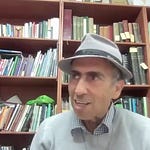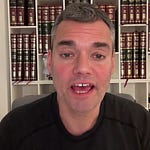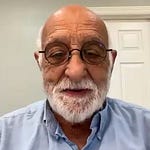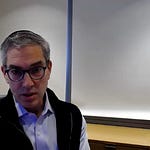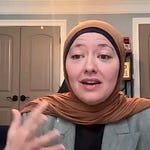Our Zoom call this week will be at the usual time: Friday at Noon EST.
Our guest will be Rabbi David Wolpe, a Visiting Scholar at Harvard Divinity School and the Inaugural Rabbinic Fellow at the Anti-Defamation League. Rabbi Wolpe has argued that “the reactions that occurred at Harvard in the wake of Oct. 7 considered Jews oppressors and, in some way, unworthy of human consideration.” He says the “overlap” between anti-Zionism and antisemitism is “striking.” I disagree. Since October 7, it’s become even more difficult to have civil disagreements about Israel-Palestine across ideological lines. But I still believe it’s important. Which is why I’m grateful that Rabbi Wolpe has agreed to join me this Friday.
Paid subscribers will get the link this Tuesday and the video the following week. They’ll also gain access to our library of past Zoom interviews with guests like Rashid Khalidi, Omar Barghouti, Thomas Friedman, Ilhan Omar, Benny Morris, Noam Chomsky, and Bret Stephens.
Sources Cited in this Video
The Palestinian Campaign for the Academic and Cultural Boycott of Israel, a founding member of the BDS movement, attacks Standing Together for “serving Apartheid Israel’s propaganda.”
Read these statements by Standing Together and its leaders and judge for yourself whether that charge is true.
Israeli Knesset Member Ayman Odeh on “ordinary people — Jewish and Arab, Palestinian and Israeli — who have stepped up in the face of unspeakable tragedy.”
Nelson Mandela on liberating the oppressor as well as the oppressed.
Things to Read
(Maybe this should be obvious, but I link to articles and videos I find provocative and significant, not necessarily ones I entirely agree with.)
In Jewish Currents (subscribe!), Aparna Gopalan writes about the United Auto Workers’ endorsement of Joe Biden.
In The Guardian, I wrote about why liberal hawks can’t come to terms with Israel’s war in Gaza.
Yousef Munayyer, Mike Omer-Man, and Udi Ofer offer three different takes on what Biden’s sanctions against violent Israeli settlers could mean.
Sasha Polakow-Suransky on why the International Court of Justice case matters so much for South Africa.
Laila al-Arian on how it feels today to be Palestinian.
Geoffrey Levin on the hidden history of American Jewish dissent over Israel.
Here’s a video of a conversation I did recently at Harvard’s Kennedy School and an interview I conducted for the Foundation for Middle East Peace with Tareq Habash, who recently resigned from the Biden administration.
If you’re in Cambridge, Massachusetts on February 7, two people I greatly admire, Mikhael Manekin and Shaul Magid, will be speaking together about their new books.
On March 6, I’ll be speaking at the University of Texas at Austin.
Mitchell Plitnick, one of America’s smartest commentators on Israel-Palestine and much else, has launched a Substack.
See you on Friday at Noon,
Peter
VIDEO TRANSCRIPT:
Hi. So, the most important issue of the day when it comes to Israel-Palestine is of course ending this horrifying war, and that’s what I talk about most weeks. But I want to talk about something else today, which is not as important, but I think is important in its own right. And it has to do with something in the Palestine solidarity movement—a particular action that really bothered me. And it’s tricky to talk about that for someone like me who’s not Palestinian but is Jewish. I think one of the things that Jews who kind of become critics of Israel, even critics of the idea of a Jewish state, we face the loss of our community that many of us have grown up in.
And so, I think what happens for some Jews is that they find a new community in the kind of Palestine solidarity world. And, in some ways, that can be really beautiful because I actually think it’s so important that the struggle for Palestinian freedom be an environment that brings together Jews and Palestinians and people of all different backgrounds. So, it’s not a tribal movement. It’s a movement about certain basic principles. But the challenge is that if you’ve kind of lost the community that you grew up in, which is I think the way some Jews feel who moved towards a kind of a politics that’s very critical of Israel, and then you join this new community, the prospect of losing that community is really, really frightening, right? Because you’ve already lost the one you grew up with. You don’t want to lose another one. And so, it becomes really, really hard to criticize that community.
I remember really being just so struck watching Norman Finkelstein years ago. Norman Finkelstein was, you know, a very, very harsh critic of Israel. Someone who, you know, many in the organized American Jewish community, you know, really reviled. And then he came out and criticized the BDS movement in really harsh ways. And I remember when I saw that, my first thought was, my gosh, is anybody gonna be left for this guy to hang out with? You know, and that might sound silly, but I actually think the truth is that a lot of people’s politics on any issue are built around a community. And it’s very, very hard to break with a community, especially if you’ve already lost one.
And so, I do think that’s what makes it hard for Jews who want to see themselves as in support of a movement for Palestinian liberation to criticize anything that people in that movement do. And, especially, it’s important if you, you know, given if you’re someone like me who has realized that, you know, there were a lot of things that I had to relearn and rethink, and things that Palestinians were saying for a long time that I didn’t recognize were true. And so, how do I maintain the humility to recognize that there still may be a lot of things that I’m wrong about, and need to listen to Palestinians about, without surrendering my right to follow my own conscience, you know, even though it may not always be right.
So, that’s a kind of long wind up to something that really bothered me, and it was a statement by the Palestinian Campaign for the Academic and Cultural Boycott of Israel, which is a founding member of the BDS movement. And it was attacking a group called Standing Together. Now, Standing Together is a group of Palestinian and Israeli citizens in Israel who are fighting for a very, very different kind of politics. And the reason the statement bothered me so much was first of all, I just felt that it seemed to me intellectually dishonest. You know, one of the things that I really notice—maybe it’s my journalism training—is the way in which you quote other people and whether it seems like you’re doing so in an honest way or not.
So, this statement, this attack on Standing Together, it accuses the group of ‘serving Apartheid Israel’s propaganda,’ and it says it ‘seeks to whitewash Israel’s ongoing genocide in Gaza.’ And then it says that Standing Together, ‘By trying to paint Israel as a tolerant diverse and normal state, and focusing on hatred rather than oppression as the problem’ makes it ‘intellectually dishonest and outright complicit.’ So, when I look at a statement like this and read these things, the first thing I look at is where are the quotation marks? Like, where has this organization, Standing Together, said the things that they’re being accused of, right? And where are the links? Like, the best practice—intellectual, honest practices—when you accuse someone of something, you quote them, and you provide a link so the reader can actually go to the quote themselves and see if the quote is actually being portrayed honestly.
And this attack on Standing Together completely fails that principle. There’s no links in it to anything Standing Together has written, which just seems to me like Intellectual Dishonesty 101. And secondly, the quotes that it does have from Standing Together, the only thing it quotes from the organization that it’s attacking are that the organization at one point said that people should reject ‘hatred and choose empathy,’ and that they support ‘peace, equality, and social and climate justice.’ But then they go on to say in their own words—this attack—all these things about how they’re serving Israel’s apartheid propaganda, they’re whitewashing the genocide in Gaza, they’re portraying Israel as a tolerant, diverse, and normal state. There’s no evidence in this attack on Standing Together whatsoever. No quotations that suggest that they have said any of that, right?
So, that’s the first thing that really bothers me. I mean, whatever position you have, it’s as a matter of kind of ethics of discourse, it’s really, really important not to accuse people of things unless you can cite evidence of him having said that. And this attack on Standing Together doesn’t do that at all. In fact, if you actually look and go for yourself to the documents of what Standing Together has put together, it calls for ‘full equality of all Israeli citizens’—I’m quoting—‘a society in which everyone is free and equal between the river and the sea.’ This is what Standing Together, one of its leaders said about the International Court of Justice statement: that ‘whatever the international court decided to call what’s happening to our people in Gaza—it should not, and it cannot change the facts of the unfathomable catastrophic de-humanization and massacres in the context of decades of systematic and violent oppression.’
So, this is just nothing remotely like serving Israel’s apartheid propaganda. If you say that you want to end the occupation, and you say that you want Palestinian citizens to be equal, that’s the opposite of Israel’s propaganda because Israel says that there isn’t an occupation and that Palestinian citizens are already equal. And to say that these people are whitewashing Israel’s ongoing genocide—Standing Together is actually one of the first Israeli groups to ever try to mobilize against the war, and call for a ceasefire, and did so in very, very, very difficult circumstances. Their efforts to hold rallies against the war in Israel were actually—the police prevented them from doing that when they tried to create protests against the war. The organization has suffered a great deal of oppression by Israel since October 7th in its efforts to organize against the war, and to bring Palestinians and Jews together for a very, very different kind of politics.
Now, it’s true that the language that Standing Together uses is really different than the language of the BDS movement. Standing Together leaders have used the term apartheid to describe Israel. But they don’t use the term apartheid as frequently as BDS leaders tend to. I haven’t seen them using the term settler colonialism. But it seems to me that Standing Together leaders—again, Palestinian citizens and Israeli Jewish citizens who are trying to fundamentally change Israeli politics—have an argument for why their language is a little bit different. And I’m going to quote from the statement made by some Palestinian members of Standing Together. They say: ‘as a movement operating within Israel, we took upon ourselves a specific role to shift Israeli public opinion away from supporting policy that maintains and deepens the subjugation of Palestinians. Our strategy is not to morally lecture or attempt to shock Jewish Israelis with the ugly truth of our reality to force them into liberating Palestinians’—and I’m skipping ahead here—‘Our role is to empower and develop joint leadership to shift public opinion and create a shared embodied struggle for liberation between Palestinians and Jewish Israelis.’
Now, I don’t think that alone will be enough to make change. I think it’s really, really fundamental that there is external pressure on Israel. And I believe that the boycotts and divestments and sanctions could play a really, really important role in all of this. But it seems to me Palestinian citizens are in a very particular position and a really difficult position, right? They’re under tremendous, tremendous strain and threat, especially since October 7th. In so many ways, their actions have been criminalized and they’ve been jailed. And they also are in a situation where they are trying to speak to Israeli Jews to create change from within. And it doesn’t seem to me one should be forced to choose between a strategy of pressure from outside, right, which involves boycotting, and strategies from inside, which involves bringing Israeli Jews in Palestinians together.
After all, think about all these Palestinian members of the Knesset, Palestinians who are sitting in Israel’s parliament, right—a parliament of a state that the BDS movement I think rightly considers an apartheid state. Should they be shunned because they’re doing normalization? No! It seems to me they’re acting from the position that they are in trying to make change from within even in really difficult circumstances. And that work is valuable as a kind of compliment to the pressure that the BDS movement brings. It just seems to me, if you take the stance that the BDS movement has taken against Standing Together, I don’t see how you wouldn’t also have to be denouncing a lot of Israeli Palestinian citizens in parliament because they also talk about bringing Israelis and Palestinians together.
Ayman Odeh, for instance, in his column in The New York Times, he writes, ‘I have also witnessed glimmers of the future we could have made real by ordinary people—Jewish and Arab, Palestinian and Israeli—who have stepped up in the face of unspeakable tragedy.’ Now, the BDS movement could say, well look here, he’s equating Jews and Palestinians, saying that they’re in the same position. I don’t think that’s what he’s saying. I don’t think that’s what Standing Together is saying. But what I do think they’re saying, which is really valuable, is they’re suggesting that their language has as its core idea that to liberate the oppressed is also to liberate the oppressor. And I think if you’re going to try to speak to Jewish Israelis—and to Jews around the world—that’s really, really important, right? And that’s something I see more in the language of Standing Together than I see in the BDS movement, which is a language about the way in which oppression dehumanizes the oppressor and the oppressed.
And it really disturbs me to see that people in the BDS movement are essentially equating that language with normalization, or with not recognizing the profound injustice of the situation. I don’t think those things are at odds at all. I mean, let me quote from, this is from Nelson Mandela. I don’t think many people would accuse Mandela of being someone who wasn’t serious about the struggle for justice. He’s writing about his time in Robben Island in prison. He says: ‘it was during those long and lonely years that my hunger for the freedom of my own people became a hunger for the freedom of all people, white and black. I knew as well as I knew anything that the oppressor must be liberated just as surely as the oppressed.’ And that language that Standing Together is using, I think, does have a capacity to reach Jews who need to be brought in to this movement.
And so, I know that there might be people who listen to this and think, you know, why is Peter Beinart criticizing the BDS movement, telling Palestinian solidarity activists what to do, you know? Who is he, you know? But the reason that I am really resistant to that kind of thinking is precisely because of my own experience in the Jewish community. I don’t like the idea that people, because of their identity position, don’t have the right to say openly what they believe. I see the way that leaders in the organized American Jewish community use that to silence others; to say that if you’re not Jewish, you don’t have a right to have an opinion about the definition of antisemitism. I reject that. I want all people of goodwill to be able to have opinions about what constitutes antisemitism. I want Germans, even despite their history, to be able to criticize a Jewish state and its Jewish leaders. I don’t like this claim that because you don’t occupy a certain identity position, you need to keep your mouth shut.
And one of the reasons I dislike it so much is because I think it sets up the idea that people in an identity group are a monolith, right? So that all Jews believe this. This is the way the organized American Jewish community often speaks: we speak for the Jewish community and if you’re against us, then you’re against the Jews. And if you’re a Jew who disagrees, you’re not a real Jew, you’re not a legitimate Jew, right? And so, I reject that principle when it comes to Palestinians as well. Sally Abed, who’s one of the leaders of Standing Together, is as far as I could tell just as Palestinian as the leaders of the Boycott Divestment Sanction movement. So, the idea that I should have to accept the idea that there are legitimate, real Palestinians and illegitimate, unreal Palestinians, or Uncle Tom or fake Palestinians, that is exactly what I see so often being done in the Jewish community.
I recognize that it’s really important to always have humility about what one doesn’t know, about how much one has to learn. That’s why I basically asked a whole bunch of Palestinians that I really admire off the record about what they thought about this BDS movement attack on Standing Together before I said any of this. I’m not quoting them because I asked them off the record. But I wanted to make sure that they didn’t think that I was completely off the wrong track, and I got a variety of responses but enough to reassure me that there was, I think, something to what I was saying. But I think it’s really important in any movement—no matter, you know, how good it’s fundamental impulses must be—that there is the right to open criticism regardless of one’s position. And that the way to have a healthy struggle for Palestinian liberation, it seems to me, is for people to have the right to offer those criticisms as long as they’re being made in good faith, and not for people to feel like they have to shut themselves down because they’re afraid of being shunned or because they’re afraid that they don’t have the right credentials. Again, I’ve just seen that too much in the organized American Jewish community, that dynamic. And I know how intellectually and morally dangerous it is.

